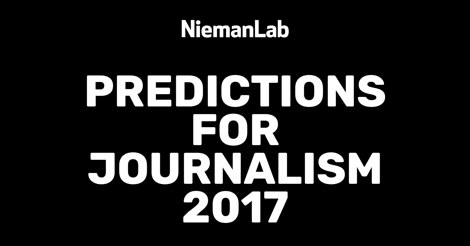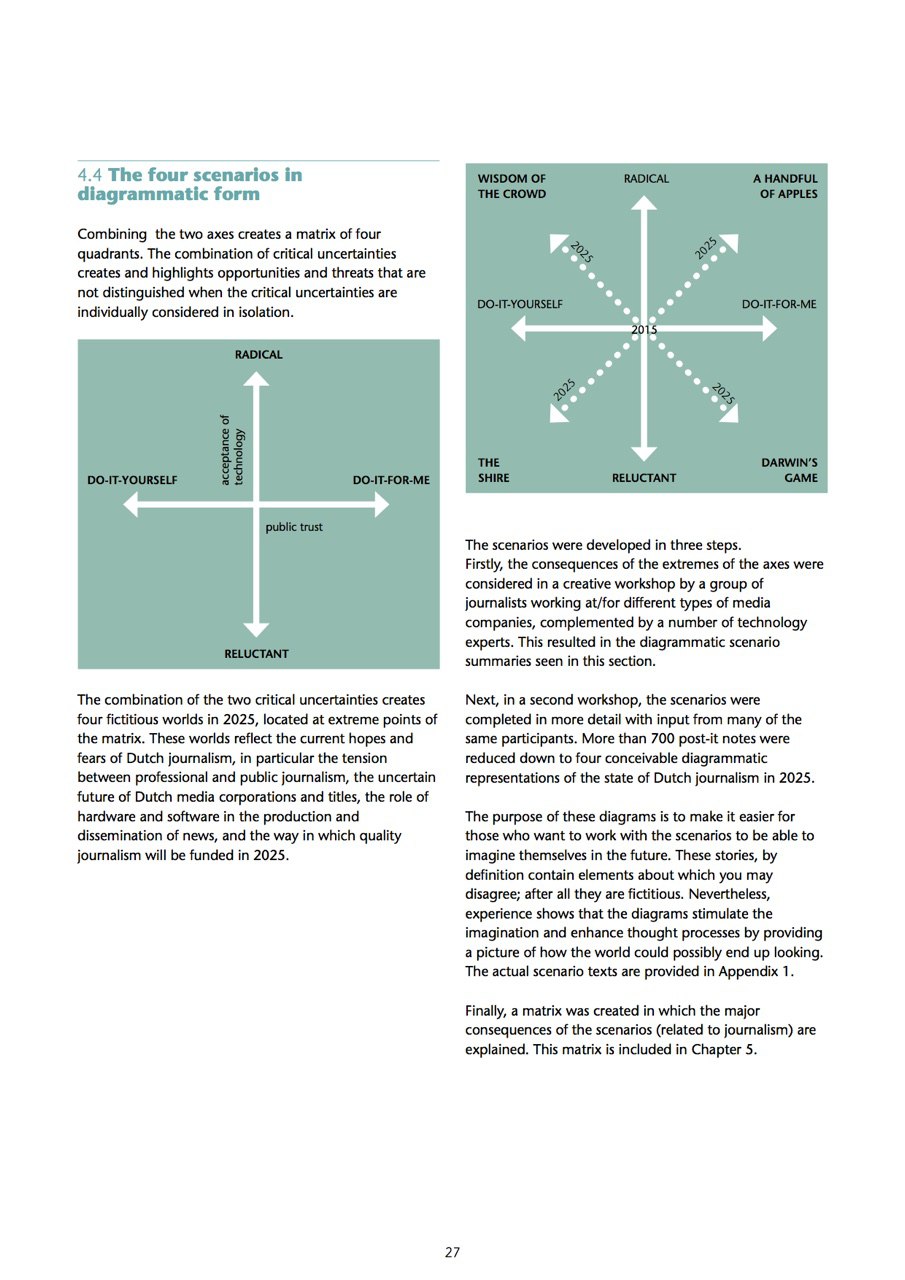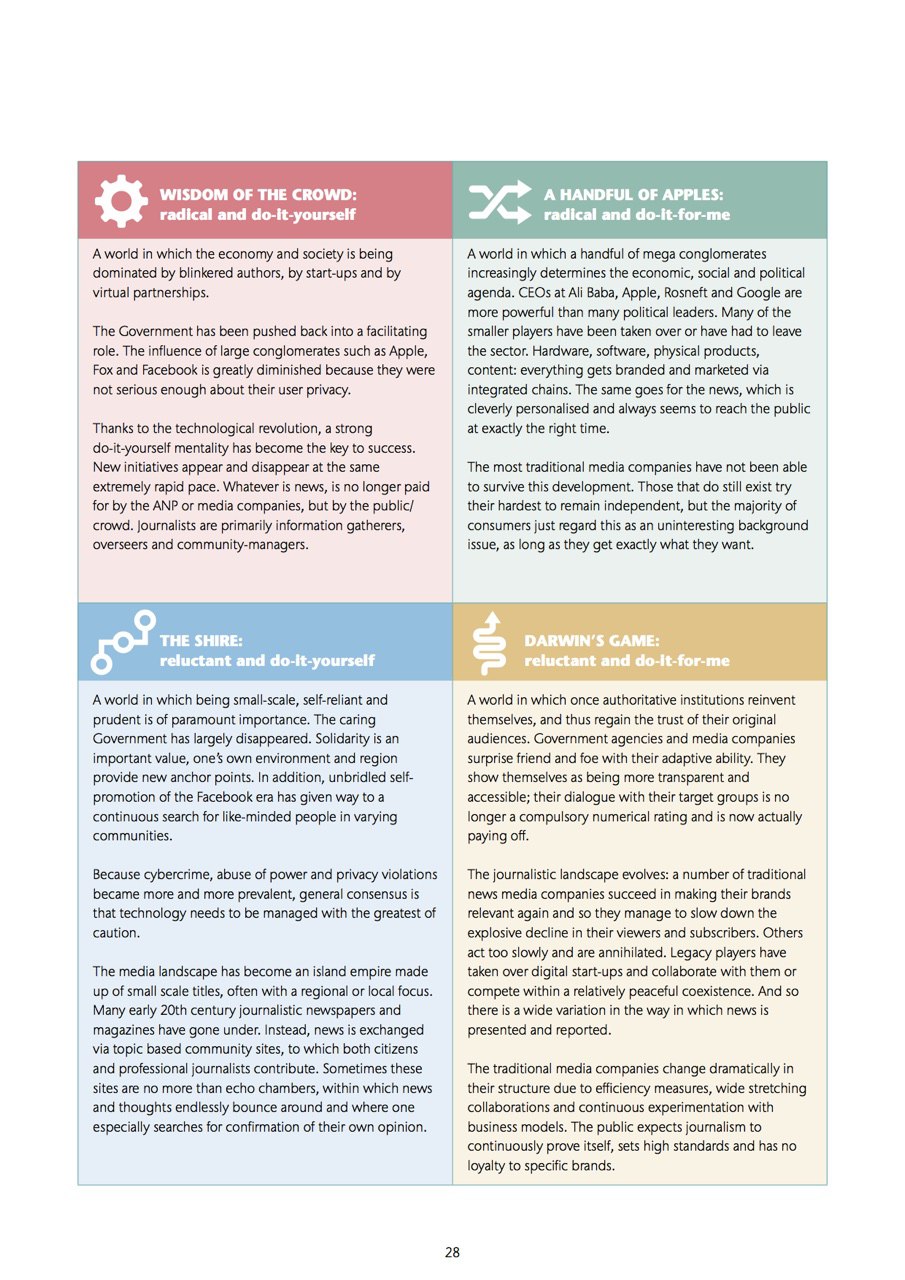
Size: a a a
2017 November 23

Каждый год Nieman Lab собирает предсказания на следующие 12 месяцев с экспертов в медиа. Очень жду, когда они начнут выпускать прогнозы на 2018-й, а пока можно посмотреть, что «сбылось», а что нет в 2017-м: http://www.niemanlab.org/collection/predictions-2017/

Сейчас накидаю избранных цитат, все равно у вас нет времени на 100-500 эссе.

Ryan McCarthy is editor-in-chief of Vice News:
Visual journalism wins. There’s been a lot of pivoting to video by web media companies, moves that have mostly overestimated readers’ appetite for video (and the ability to make money of it). But there’s more going on here. TV channels are trying to become websites; websites are trying to become like TV channels. On Facebook, Snapchat, and Twitter, readers have become to expect a visual layer places on top of stories. Online news is quickly becoming visual, and at Vice News we build that into the core of what we do.
Visual journalism wins. There’s been a lot of pivoting to video by web media companies, moves that have mostly overestimated readers’ appetite for video (and the ability to make money of it). But there’s more going on here. TV channels are trying to become websites; websites are trying to become like TV channels. On Facebook, Snapchat, and Twitter, readers have become to expect a visual layer places on top of stories. Online news is quickly becoming visual, and at Vice News we build that into the core of what we do.

✅ Сбылось. Новости все больше становятся короткими (и часто вертикальными) видео. Медиа (и не только блогеры, а большие консервативные ИД) захватывают короткие визуальные форматы.

Rachel Sklar is cofounder and CEO of TheLi.st.
Well. You’ll hear something 2017: the sound of women getting loud AF. Women who want to have lives and have careers and have babies if they damn well want to and not for any other reason decided by any other person are going to say so. They — we — are going to be loud about it on Twitter, and on Facebook and Snapchat and Instagram Stories, and at a certain march on Washington next month. We’re going to be loud about it in print and in art. We’re going to start more podcasts, because cable news is still pale, male, and stale but examples like Another Round and 2 Dope Queens and Call Your Girlfriend have now provided templates.
Well. You’ll hear something 2017: the sound of women getting loud AF. Women who want to have lives and have careers and have babies if they damn well want to and not for any other reason decided by any other person are going to say so. They — we — are going to be loud about it on Twitter, and on Facebook and Snapchat and Instagram Stories, and at a certain march on Washington next month. We’re going to be loud about it in print and in art. We’re going to start more podcasts, because cable news is still pale, male, and stale but examples like Another Round and 2 Dope Queens and Call Your Girlfriend have now provided templates.

✅ Сбылось неожиданным образом. Мы услышали не просто лозунги — Голливуд, начиная с Харви Вайнштейна, начал радикально меняться.

(Ужасно многословные некоторые эссе).

Следующие три огромных абзаца я перескажу коротко. Красиво просто сказано.

M. Scott Havens is global head of digital at Bloomberg Media.
The current state of the digital advertising woes owe a great deal of ingratitude to Hotwired.com’s launch of the first banner ad in 1994. Not that anyone else had a better idea at the time, but taking an old ad format — inspired by print and/or outdoor advertising — and migrating it to a new medium is never a good idea. Sure, there have been noble attempts at transforming digital advertising over the last 25 years — and countless examples of effective and impactful digital campaigns — but the industry has never quite recovered from that first banner unit.
While there are many reasons that the Duopoly has been successful at grabbing the lion’s share of the digital ad market (including: unrivaled scale and engagement, amazing access to and use of data on individuals and their behavior, and a powerful self-serve/programmatic/attributable delivery system), the platforms have been thriving because their ads work — people actually use them, people actually buy products because of them. And importantly, the ads don’t feel foreign to these platforms — they feel native.
When you consider how publishers might compete with the platforms going forward — without the scale, data, or sophisticated ad platforms — it seems likely it will take the same thoughtful and high-minded approach around advertising that we take now with our content. Publishers must understand our audience better than anyone, help our clients solve their problems, wrap in sophisticated first-party data, and ultimately deliver high-quality and effective cross-platform advertising experiences seamlessly woven into our great content — slugged appropriately, of course. Call it branded, native, sponsored content — or simply advertising — but there is no doubt that done well, the experience for users is better, the ads are more impactful, and perhaps publishers might reclaim some of the lost territory — or as importantly, avoid losing the future branding dollars that will flow from TV.
The current state of the digital advertising woes owe a great deal of ingratitude to Hotwired.com’s launch of the first banner ad in 1994. Not that anyone else had a better idea at the time, but taking an old ad format — inspired by print and/or outdoor advertising — and migrating it to a new medium is never a good idea. Sure, there have been noble attempts at transforming digital advertising over the last 25 years — and countless examples of effective and impactful digital campaigns — but the industry has never quite recovered from that first banner unit.
While there are many reasons that the Duopoly has been successful at grabbing the lion’s share of the digital ad market (including: unrivaled scale and engagement, amazing access to and use of data on individuals and their behavior, and a powerful self-serve/programmatic/attributable delivery system), the platforms have been thriving because their ads work — people actually use them, people actually buy products because of them. And importantly, the ads don’t feel foreign to these platforms — they feel native.
When you consider how publishers might compete with the platforms going forward — without the scale, data, or sophisticated ad platforms — it seems likely it will take the same thoughtful and high-minded approach around advertising that we take now with our content. Publishers must understand our audience better than anyone, help our clients solve their problems, wrap in sophisticated first-party data, and ultimately deliver high-quality and effective cross-platform advertising experiences seamlessly woven into our great content — slugged appropriately, of course. Call it branded, native, sponsored content — or simply advertising — but there is no doubt that done well, the experience for users is better, the ads are more impactful, and perhaps publishers might reclaim some of the lost territory — or as importantly, avoid losing the future branding dollars that will flow from TV.

Коротко: мы до сих пор до конца не отошли от формата газетных объявлений, которые перенесли в 1994-м году в молодой тогда интернет. Издателям нужно развивать свою экспертизу в рекламе, делать высококачественную и дорогую нативку, не забывая про технологии.

Matt Karolian is director of audience engagement at The Boston Globe.
Apple, Google, and Facebook will merge their fragmented audio, search, and news ecosystems while leveraging artificial intelligence to make recommendations across content types. For example, if you read an article in The Economist, you might get recommended a similar episode of the Planet Money podcast. This approach keeps users engaged with their devices and services longer…something that is financially advantageous for Apple, Google, and Facebook.
Robots will analyze complex editorial content of all lengths, and provide feedback to the humans sitting behind the keyboard. Much like how Netflix used data to help fine-tune House of Cards, news organizations will have the opportunity to adjust editorial narratives to make stories more engaging.
Apple, Google, and Facebook will merge their fragmented audio, search, and news ecosystems while leveraging artificial intelligence to make recommendations across content types. For example, if you read an article in The Economist, you might get recommended a similar episode of the Planet Money podcast. This approach keeps users engaged with their devices and services longer…something that is financially advantageous for Apple, Google, and Facebook.
Robots will analyze complex editorial content of all lengths, and provide feedback to the humans sitting behind the keyboard. Much like how Netflix used data to help fine-tune House of Cards, news organizations will have the opportunity to adjust editorial narratives to make stories more engaging.

❇️ Не сбылось до конца, но медленно сбывается.

Удивительно все-таки, как все до сих пор разделяют индустрии. Я не знаю, как называется этот новый тип медиа, который может быть и блогером, и блогером с редакцией, и редакцией из 2 человек, и огромной редакцией, и брендом с мощным сторителлингом, но очевидно, что это теперь, что это одно и то же — работает по одним законам, обращается к одной аудитории, одинаково не имеет гарантированного доверия (что может быть и неплохо), находится на одних площадках — платформах с мощным AI.

Felix Salmon is a senior editor at Fusion.
People get their news from headlines now in a way they never did in the past, just because they see so many of those headlines on Twitter and Facebook.
People get their news from headlines now in a way they never did in the past, just because they see so many of those headlines on Twitter and Facebook.

✳️ Это правда, и это мы видим по тому, как люди потребляют Дзен. Поэтому так много внимания уделяем заголовкам.

Еще немного про будущее, но не так занудно:

В 2015-м году датские медиа-эксперты написали сценарии развития медиа до 2025 года. С красивым графиком, который я постоянно теперь использую. Будущее будет, конечно, где-то между всех осей, но читать это интересно.

В Штатах продолжается история с видеороликами на Youtube, которые по содержанию совсем не детские, но автоматически рекомендуются для просмотра детям, так как хитрые контент-маркетологи вставляют в них детских персонажей.
После серии скандалов Youtube решил ужесточить правила размещения детского контента. Во-первых, авторы будут обязаны маркировать контент, который может нанести вред детям. Сомнительный контент с использованием персонажей из детских мультиков (например, Свинки Пеппы) перестанет монетизироваться. Кроме того, Youtube будет мониторить агрессивные комментарии под детскими видео и вообще отключать возможность комментирования в них.
https://techcrunch.com/2017/11/22/youtube-tightens-rules-on-kid-related-content/
После серии скандалов Youtube решил ужесточить правила размещения детского контента. Во-первых, авторы будут обязаны маркировать контент, который может нанести вред детям. Сомнительный контент с использованием персонажей из детских мультиков (например, Свинки Пеппы) перестанет монетизироваться. Кроме того, Youtube будет мониторить агрессивные комментарии под детскими видео и вообще отключать возможность комментирования в них.
https://techcrunch.com/2017/11/22/youtube-tightens-rules-on-kid-related-content/






